Dear Reader, in this age of AI created content, please support with your goodwill someone who works harder to provide the human-made. Sign up at the top of the lefthand column or bottom of this page. You will receive my hand illustrated monthly newsletter RESTORE NATURE and access to the biodiversity garden design course as I write...and nothing else, I respect your time. I am also removing the advertizing as best I can as its become intrusive inappropriate and pays me nothing.
flower garden design and plant combinations
When approaching flower garden design there are many reasons to visit our local National Botanical Garden, Kirstenbosch. Not only does it feature South African plants
in abundance, and give inspiration on good plant combinations, the designers have contact with some of the best designers in the world, and experimentation with new ideas infuses the garden, as plantings are replaced. Our local plants are particularly suited to experimental garden design, being dramatic and of unusual colour, rather than vivid green. Grass gardens have been around for a while, but the diversity of Cyperaceae, Restionaceae and grasses, and their subtle colouring could make the most beautiful ‘grass’ gardens just from South African varieties. After perusing many photographs of grass gardens, I concluded that the use of South African plants would make the most of the possibilities. The grass garden at Kew I don't find as delightful an example as some others. I will give you this link but do not favour any of the pictures personally. Remember grass gardens are flower gardens, those tiny dry heads on the grass are flowers, and its just another approach to working with colour, away from the primaries and into subtle variation. I recommend taking a look at some grass gardens, you can google them and trawl through the pictures.
flowers and garden design
A beautiful garden can have big colourful flowers, but flowers should not be the raison d’etre and backbone of the
garden, in my opinion. Bright splashes of colour are lovely, but flower garden design must go beyond pure colour to respect the form of these bright flowers, and the contexts you place them in and the forms and shapes and colour of foliage you contrast them with otherwise all you have is formless, rather arbitrary colour, without the charm of wild profusion or the delight of discovery.
no need to be neat in flower garden design
Today extreme minimalism and wild untidiness are competing streams in flower garden design. A flower garden does not have to be neat, unless you like that sort of thing and would like to work very hard.
Form, distribution, patterning, shape, texture and diversity are all relevant in the complex (untidy for some) combinations in a meadow garden. Here there are many lovely examples on google images, for example. The beauty of surprising elements, like dead plants is also worth investigating. See the beautiful plant combinations photographed by Piet Oudolf's selection of garden photographers, in which the winter photographs of dead flower heads are magical.
Taking inspiration from master gardeners and the greatest master gardener, so called 'nature'
Here is a selection of mixed planting by Piet Oudolf. He claims art, garden photography and nature as his inspiration. The connection with nature is clearly visible.
back to kirstenbosch for inspiration in truly local flower garden design
And yet, in my openly biased opinion, there is something equally beguiling about some very old fashioned Kirstenbosch plantings such as these in the succulent garden, so rhythmical and entrancing they are. The pink and white Agathosma ? flowers bottom right are as delicate as all the other plantings, as well as contrasting subtly with the rest as it constitutes the extreme in terms of redness, against the greys, greens and blacks.
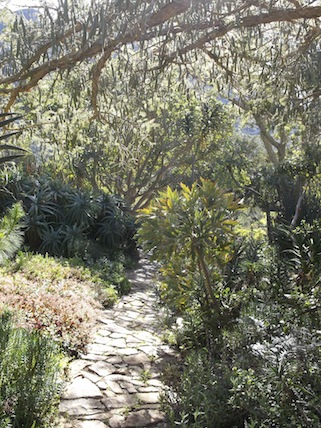
Generally the spring flower displays at Kirstenbosch are down in the lower gardens where most visitors go, and are massed for colour rather than subtlety. I've been to the garden so often, and it’s the back roads where I find delight. Here are some of the combinations I found.
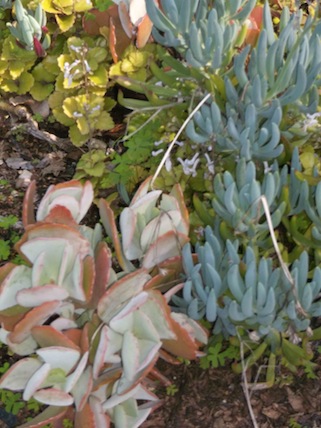
This combination of succulents acquires its interest both from the differences in colour of the yellow green, the grey green and the pinky white and the differences in form, from tight rosettes of spoon shaped leaves, to needle shaped, to flat frilly edged leaves. Yet all are of a similar size, belonging together in the carpet in which they are planted. The spidery white Plectranthus flowers are almost incidental and add a note of freshness.
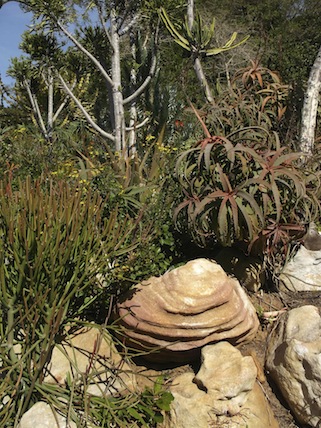
For me the delight in this combination is of contrasts in repeating rhythmical pattern, the incurved fat leaves of the aloe, the outward radiating straight fine branches of the Euphorbia ? and the fat silver trunks of the trees behind, branched like candelabras, with the circular concentric grooves in the rock creating a magnet for the gaze in the foreground. The sprinkling of yellow flowerheads in the mid ground, is enough to make it pretty in its own alien fashion.
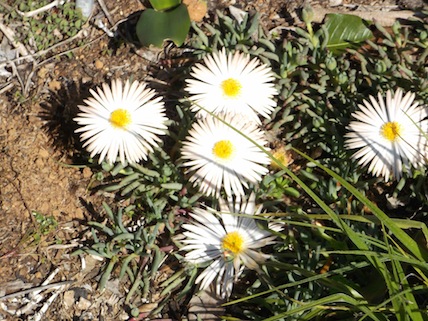
The fried egg colours of the Meseums ? in this picture are completed by the deep green blades of the wild iris growing nearby, making a lovely form and colour contrast which could become a garden theme.
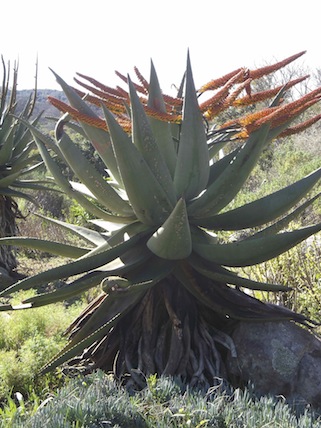
The flowering orange spikes and fat robust leaves of the aloe contrast beautifully with the feathery grey vegetation surrounding it, and I think this could have been emphasised further by surrounding these aloes with soft flowering grasses of different colours in the background, so that they did not conceal its form. The horticulturists may have feared their invasiveness though.
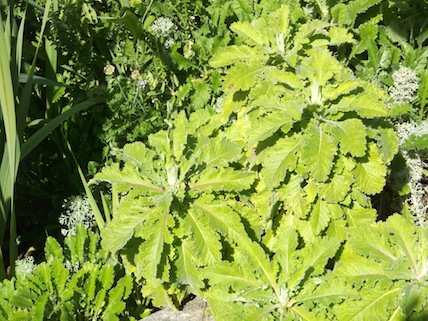
Here I love the combination of large, soft, yellowish frilly leaves with small highly branched grey plants, the tight white and gold flower heads and the long blades of the gladiolus ? There are flowers in the picture, but they do not dominate, and shape is more important.
------
------
------
-------
vegetable gardening the natural low cost way
------
-------
garden flower's names: small tree white blossoms
------
a pink flowering garden in late summer drought
Restore Nature Newsletter
I've been writing for four years now and I would love to hear from you
Please let me know if you have any questions, comments or stories to share on gardening, permaculture, regenerative agriculture, food forests, natural gardening, do nothing gardening, observations about pests and diseases, foraging, dealing with and using weeds constructively, composting and going offgrid.
SEARCH
Order the Kindle E-book for the SPECIAL PRICE of only
Prices valid till 30.09.2023
Recent Articles
-
garden for life is a blog about saving the earth one garden at a time
Apr 18, 25 01:18 PM
The garden for life blog has short articles on gardening for biodiversity with native plants and regenerating soil for climate amelioration and nutritious food -
Cape Flats Sand Fynbos, Cape Town's most endangered native vegetation!
Apr 18, 25 10:36 AM
Cape Flats Sand Fynbos, a vegetation type found in the super diverse Cape Fynbos region is threatened by Cape Town's urban development and invasive alien plants -
Geography Research Task
Jan 31, 25 11:37 PM
To whom it may concern My name is Tanyaradzwa Madziwa and I am a matric student at Springfield Convent School. As part of our geography syllabus for this
"How to start a profitable worm business on a shoestring budget
Order a printed copy from "Amazon" at the SPECIAL PRICE of only
or a digital version from the "Kindle" store at the SPECIAL PRICE of only
Prices valid till 30.09.2023







